One step forward, two steps back
The trials and tribulations of finding a co-founder
Welcome to the 3rd edition of From Scratch. The last couple of weeks have been hectic and a bit of a roller coaster. Finding a co-founder isn’t easy but how privileged am I for that to be the main cause of stress in my life at the moment. As I’m sure is the case for many of you, I’ve found myself glued to the news since the days leading up to the invasion and checking in on the latest developments is the first and last thing I do each day. The scenes on TV are absolutely horrifying and it beggars belief that this is happening in a European democracy in 2022. Whatever happens in the coming days and weeks, I will forever be in awe of the Ukrainian people. The unquestioning commitment of ordinary people to leave their desk jobs one day and hold arms the next to defend their homeland is hard to relate to as a 32 year old Brit, but incredibly inspiring all the same. My thoughts and prayers are with everybody affected and I really do hope we see a swift resolution to the conflict.

Finds
My find this week is from a great startup called The Garden. It’s a Community for the Curious and provides live and on-demand talks with world leading experts on a whole host of topics. A recent talk they held, which I confess I haven’t got around to watching yet, but my Mum assures me is excellent, is on the current crisis in the Ukraine – Why can’t Putin accept Ukraine’s independence? The Garden is still in beta, so the talks are free for the time being at least. Go check it out.
Track out fun and games
I released my last blog at the end of week 2. In it, I described the first couple of weeks as the calm before the storm. That it was but I’ve since realised that tracking out is really just the start of the hard stuff. Track outs opened at the start of week 3 and despite knowing what was coming, I definitely felt a little off and a bit stressed by it all. We no longer had the structure of programmed sessions occupying most of our days, and therefore it was on each of us to make things happen. To test working styles in small self-organised groups and to really try and get to know people on your ‘shortlist’. If you weren’t in those small group meetings or always rushing off for another one-to-one, you somehow felt like you were being left behind or not doing enough, or worse yet, not credible. I was expecting these feelings but it didn’t make them any easier to deal with.
By Friday of week 3, I thought I’d found the one and we’d tentatively agreed to track out at the start of the following week. Since the very first day, I’ve got on super well with a guy from Greece called Vasilios Nikolaou, who goes by Vas. He’s one of the friendliest people you’ll ever meet, even if he does have questionably long hair and an iffy sense of humour! As a technical guy, and one who can explain things in such a way us non-techs can actually understand, he’s understandably been in high demand. As a result, I wasn’t overly surprised on the Monday of week 4 when he shared with me that somebody else from the cohort had brought an idea to him and that he was seriously considering it. I wasn’t resentful or annoyed, as at that stage we didn’t have an idea, we just liked each other and liked the idea of trying to build a company together as mates. And clearly we are well suited from a skillset perspective. Anyway, to cut a long story short, for a couple of days it was looking like I might join Vas and the person who brought the idea to him but she was still weighing up an offer she had from another team. Ultimately, she decided to join that other team and they’re working on a wealth management play in the Crypto space and myself and Vas have now officially tracked out. A lot of Antler’s portfolio company founders have told us to trust our gut when it comes to deciding who to track out with, and that’s definitely what I’ve done.
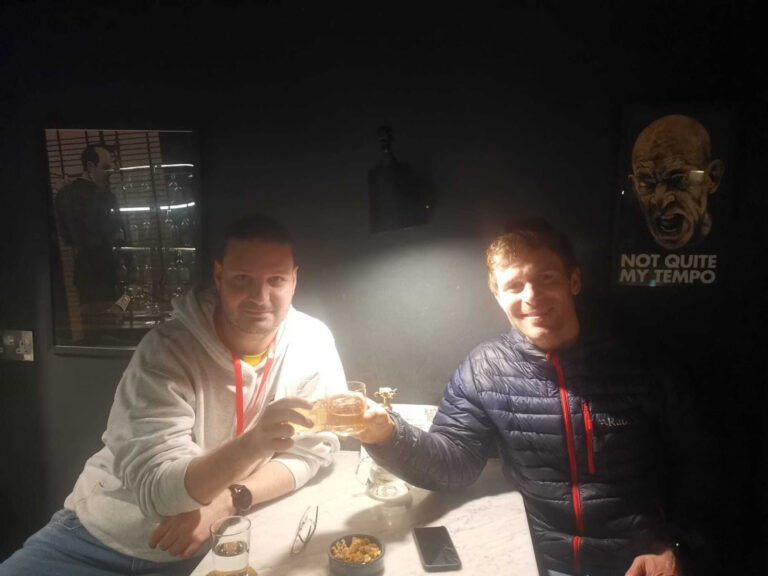
(Prenups signed and the partnership consummated over an old fashioned at BlackRock)
We’re currently exploring opportunities in the travel space and specifically how tourists’ experiences of cities can be improved. If you have 3 mins, please do take the time to fill out a quick survey we’ve been running to better understand travel preferences. If you’re a particularly active traveller and willing to spare 15 mins for a chat, please do let me know.
Since the first day, we’ve been encouraged to move quickly and fail fast. Whilst I get on very well with Vas and I hope we remain a team, I know that’s not a given. We’ve already seen ~50% of the teams break up and track back in, some doing so after working with each for just 24 hours. For some it was a clash in working styles that drove them apart, and for others it was a lack of alignment on problem areas or just not making enough progress together. Myself and Vas are keenly aware that we need to really nail down a problem area, but so far so good.
Painkillers, Vitamins and Sweets
We’ve had some really awesome sessions over the past 2 weeks. We’ve heard from Antler’s Venture Partners, people that have been there and done it and now advise early stage startups. They include one of the Monzo co-founders, so super credible people. We’ve also spent time looking at different business model archetypes, what problems are worth exploring and how to run better experiments – i.e. how to iterate once a problem statement has been identified. Myself and Vas have been guilty of jumping too quickly from problem area to potential solutions, without properly understanding the problem and validating it. As such, I thought it might be worth spending a little time exploring this process as well as talking about Painkillers, Vitamins and Sweets, which is a really handy way to think about different types of products and companies.
So what makes a good problem to work on? The list below is a helpful heuristic to think about the sorts of problems that might support venture backable businesses.
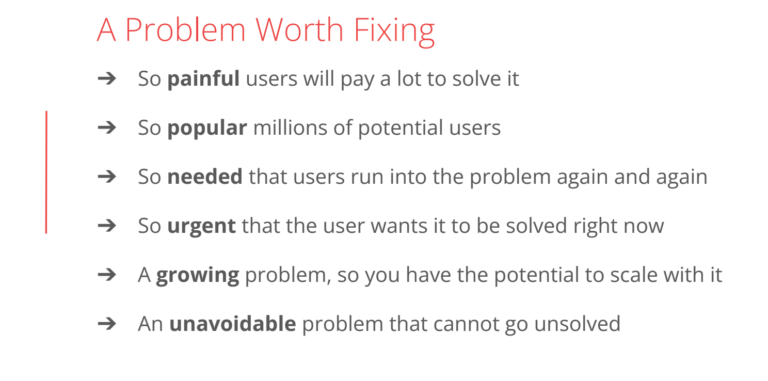
Essentially, the problem needs to be acute, it needs to be something people come up against repeatedly, and, most importantly, people would be willing to pay to have it solved. This is the big one, we all have trivial issues in our lives but they’re often not big enough pains that we’d actually pay to not have to deal with them. For example, I find it annoying when my shoelaces come undone when cycling or carrying shopping, but I wouldn’t pay to have this problem solved, I should just be more diligent when tying them. However, a problem like poor sleep is definitely big enough that I would pay to have solved (at least improved), and indeed I do, with a Whoop subscription. Which, despite being pretty pricey, I absolutely love. We all sleep, ideally for ~8 hours per night, and poor sleep has a detrimental impact on all other parts of our lives; on our mood and the quality of our decision making, on our physical and mental performance, as well as on our relationships with colleagues, loved ones and friends. As such, poor sleep potentially ticks all the criteria above and, therefore, is an excellent problem for people to work on. As a result, it’s not surprising that there’s a whole host of companies with products in this $85 billion market. Companies from $2tn behemoths like Apple (watch) to smaller startups like 8 Sleep (smart mattresses) are fighting for their share of this huge prize.
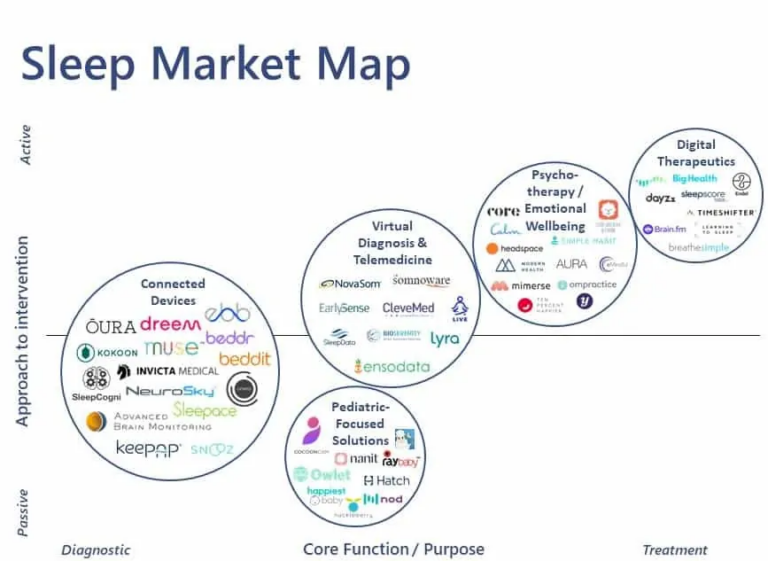
Not all worthy problems need to tick all six criteria but they probably need to have at least three to be viable as venture backable business. VCs invest early and it’s a volume game. It doesn’t matter if the vast majority of their investments from a particular fund fail, as long as one or two become huge businesses that will be able to ‘return the fund’, and some. This asymmetric nature of VC investing helps explain why it is potentially so lucrative and why so much money has flowed into the sector in recent years. An investment can only go to zero but it has the potential to increase into the billions, which can mean returns to the fund in the tens, hundreds, and even thousands of times in the case of the earliest backers of Facebook. Given this immense upside potential, VCs want to know that if everything goes well their investment could become a (multi)billion dollar company, otherwise it simply doesn’t justify the risk in their eyes.
So you’ve identified a juicy enough problem, then what?. Then you do absolutely everything you can to truly understand the problem. Not how it manifests and shows up in customers’ lives, but the root cause of it. The danger with problems is that it’s incredibly easy to be guided by assumptions and biases and not by fact. The only way to ensure you are is to speak with customers and to then act on the data. Speaking with customers is a real art form and by far the best resource to learn how to ask open ended questions and to get the most out of these interviews is the Mom Test. One sentence summary: Mum’s would lie to you because they don’t want to hurt your feelings, so it’s essential to Mum proof your questions. It’s thought 40 interviews are enough to collect adequate data in order to truly understand a problem and from there, you have enough to go on to start thinking about the fun stuff, potential solutions.
My next blog will explore the problem area we’re working on and potential solutions we’re considering. Kosta Kolev ran a great session with us a week or so ago about iterating on potential solutions and he shared the below slide with us, which I thought you guys might also find interesting.
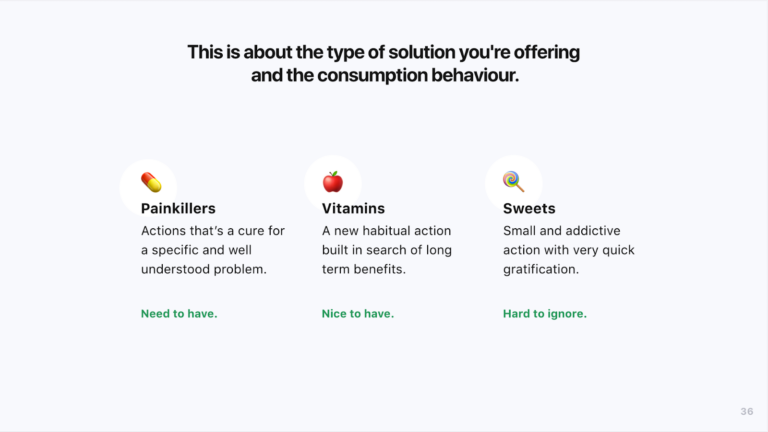
While we’re trying to be disciplined and really understand the problem tourists have when visiting cities before thinking about possible solutions, we can already see that our potential solutions are looking more like Vitamins than they are Painkillers and Sweets. They’re nice to haves but that’s not necessarily an issue. In reality any product or company has the potential to be two or even three. It just depends who you ask. For many, Uber is a Painkiller. Taxis pre Uber were a nightmare, super expensive and hard to find, but for me, I rarely take an Uber and am happy with the tube. Likewise, with Sweets, where social media immediately springs to mind, Instagram is much more of a Vitamin product for my Mum than it is for a teenager, say. So while our solution will inevitably be a Vitamin, at least to start with, my hope is that for many it will quickly go from being a Vitamin to a Painkiller, and for a smaller number, it might even become a Sweet.
Do Fidem
Saturday marked my graduation from the MBA programme at the University of Oxford. I’m not usually one to love events like these, but I really enjoyed being able to share it with my parents and with some familiar faces. MBAs are a lot of fun, but they’re also hard work and the application process alone is a serious undertaking and brings back some less than pleasant memories of GMAT prep and admission essays about how I might change the world one day! I pursued an MBA to challenge myself, to meet amazing people and to broaden my horizons. Oxford delivered on all three counts. It was definitely tough at times, especially as a covid struck halfway through, but it gave far more than it took. SBS (Saïd Business School) is a magnificent place to do an MBA. Of the ~330 MBAs, 95% are international, with 70+ nationalities represented. Despite growing up less than an hour from Oxford, I left like a foreigner in the business school, but in a good way. I wanted to be surrounded by people from all corners of the planet and learn from their different perspectives and outlook on life. SBS is also unique because it’s a part of the wider University and therefore you’re admitted to a college, Keble in my case, and able to participate in all the University societies and sports teams. I was very fortunate to be a part of two varsity rugby campaigns and absolutely loved my time with OURFC, especially in 2021 when we got our own back and ‘shoed the tabs’ at Welford Road 👞. I was also very lucky to play a season with the mighty Divots, and play some of the best golf courses in the country, with some awesome team mates. Oxford is controversial for some. It’s an 800 year old institution and therefore it’s not surprising that some of its history is less than perfect. Some see Oxford as elite and out of touch but my experience of it, both at the undergraduate and postgraduate level, was of a group of genuinely humble, thoughtful and highly capable people that I loved being around.

Oxford is weird, however, and no better is that illustrated than in the dress. ‘Sub fusc’ is the academic dress for matriculation (formal admission to the University), exams and graduation. It’s essentially white tie, a gown and mortar board. Only at Oxford does your exam day stress peak before it’s even started, when you’re in your room trying to remember how to tie a damn bowtie, never mind business finance equations! On the first day of the MBA back in late September 2019, the Dean finished his welcome address to us by reiterating that
“strength is for service, not for status”.
And then yesterday felt like a fitting way to round it off when the Vice Chancellor made it clear to us all that
“it’s not what you know, but what you do with what you know”.
I feel extremely grateful to have had the opportunity to study at Oxford and I’m determined to make sure I use what I’ve learnt to do some good in this world.
This has been an exceptionally long post, so well done if you’re still here. A last thing to add is a very happy Birthday to my Mum!! It’s been great to be able to celebrate it all together in the Cotswolds.
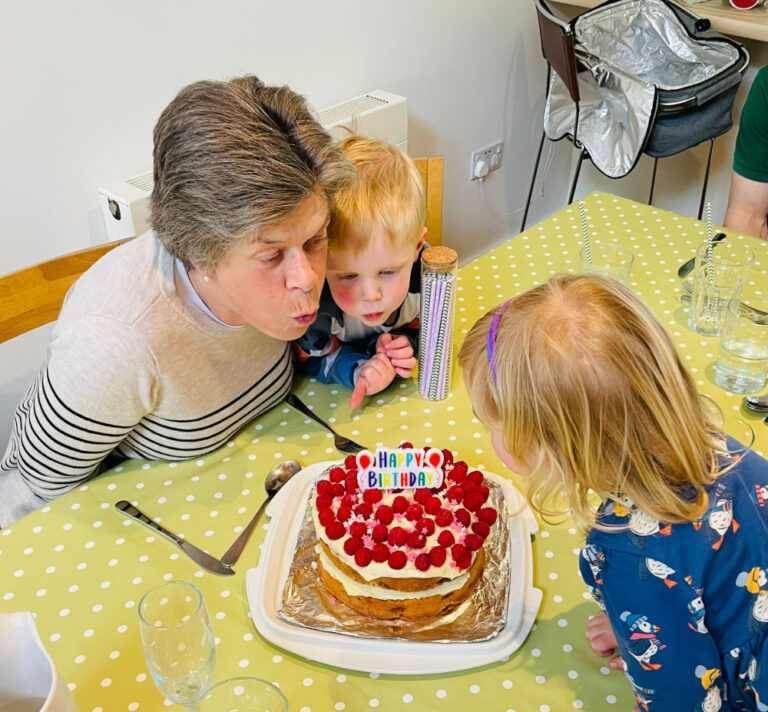
Have a great week all and I’ll catch you in a couple of weeks.
✌️
